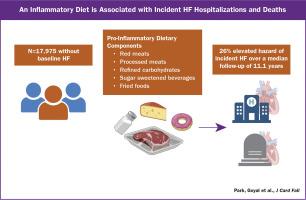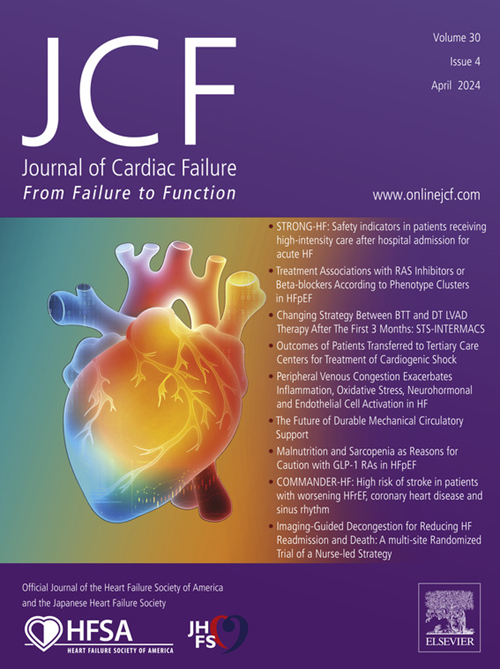Dietary Inflammatory Score and Incident Heart Failure in the Reasons for Geographic and Racial Differences in Stroke (REGARDS) Study
IF 8.2
2区 医学
Q1 CARDIAC & CARDIOVASCULAR SYSTEMS
引用次数: 0
Abstract
Background
Inflammation plays a key role in the development of heart failure (HF), and diet is a known modifiable factor that modulates systemic inflammation. The dietary inflammatory score (DIS) is a tool that quantifies the inflammatory components of diet. We sought to determine whether the DIS is associated with incident HF events.
Methods
We examined a total of 17,975 participants without HF at baseline who were in the REasons for Geographic and Racial Differences in Stroke (REGARDS) cohort. The main exposure variable was the DIS quartile, which was derived from the Food Frequency Questionnaire obtained at baseline study enrollment. The main outcome was an incident HF event, defined as hospitalization due to HF or death. To examine the association between the DIS and incident HF events, we conducted Cox proportional hazard regression modeling, adjusting for total energy intake, sociodemographic factors and pro-inflammatory lifestyle behaviors.
Results
The sample mean age was 64 + 9.2 years, 55.8% were female, and 32.3% were Black. Over a median follow-up of 11.1 years, we observed 900 incident HF events, including 752 hospitalizations and 148 deaths due to HF. In an adjusted model, the highest DIS quartile (Q4) was associated with incident HF (HR 1.26 95% CI 1.03–1.54). Of note, these findings remained, even after adjusting for comorbid conditions and physiological parameters. In an age-stratified analysis, the association was present only in those aged < 65 years (Q4: HR 1.65 95% CI 1.08–2.51). Moreover, the association was present for heart failure with reserved ejection fraction (Q4: HR 1.44 95% CI 1.07–1.94) but not for heart failure with preserved ejection fraction.
Conclusion
The highest DIS quartile was associated with incident HF events. These findings indicate the potential value of specific dietary patterns to prevent HF.

饮食炎症评分和心力衰竭在卒中地理和种族差异(REGARDS)研究中的影响。
背景:炎症在心力衰竭(HF)的发展中起着关键作用,而饮食是一个已知的调节全身炎症的可调节因素。饮食炎症评分(DIS)是一种量化饮食炎症成分的工具。我们试图确定DIS是否与心衰事件相关。方法:我们在卒中地理和种族差异的原因(REGARDS)队列中检查了17975名基线时无心衰的参与者。主要暴露变量是DIS四分位数,它来源于基线研究入组时获得的食物频率问卷。主要结局为心衰事件,定义为心衰住院或死亡。为了检验DIS与心衰事件之间的关系,我们进行了Cox比例风险回归模型,调整了总能量摄入、社会人口因素和促炎生活方式行为。结果:样本平均年龄64岁 + 9.2岁,女性55.8%,黑人32.3%。在中位11.1年的随访中,我们观察到900例心衰事件,包括752例住院和148例心衰死亡。在调整后的模型中,最高DIS四分位数(Q4)与HF事件相关(HR 1.26, 95% CI 1.03-1.54)。值得注意的是,即使在调整了合并症和生理参数后,这些发现仍然存在。在年龄分层分析中,这种关联仅存在于年龄< 65岁的人群中(Q4: HR 1.65 95% CI 1.08-2.51)。此外,与HFrEF相关(Q4: HR 1.44 95% CI 1.07-1.94),但与HFpEF无关。结论:DIS四分位数最高与心衰事件相关。这些发现表明特定饮食模式对预防心衰的潜在价值。
本文章由计算机程序翻译,如有差异,请以英文原文为准。
求助全文
约1分钟内获得全文
求助全文
来源期刊

Journal of Cardiac Failure
医学-心血管系统
CiteScore
7.80
自引率
8.30%
发文量
653
审稿时长
21 days
期刊介绍:
Journal of Cardiac Failure publishes original, peer-reviewed communications of scientific excellence and review articles on clinical research, basic human studies, animal studies, and bench research with potential clinical applications to heart failure - pathogenesis, etiology, epidemiology, pathophysiological mechanisms, assessment, prevention, and treatment.
 求助内容:
求助内容: 应助结果提醒方式:
应助结果提醒方式:


